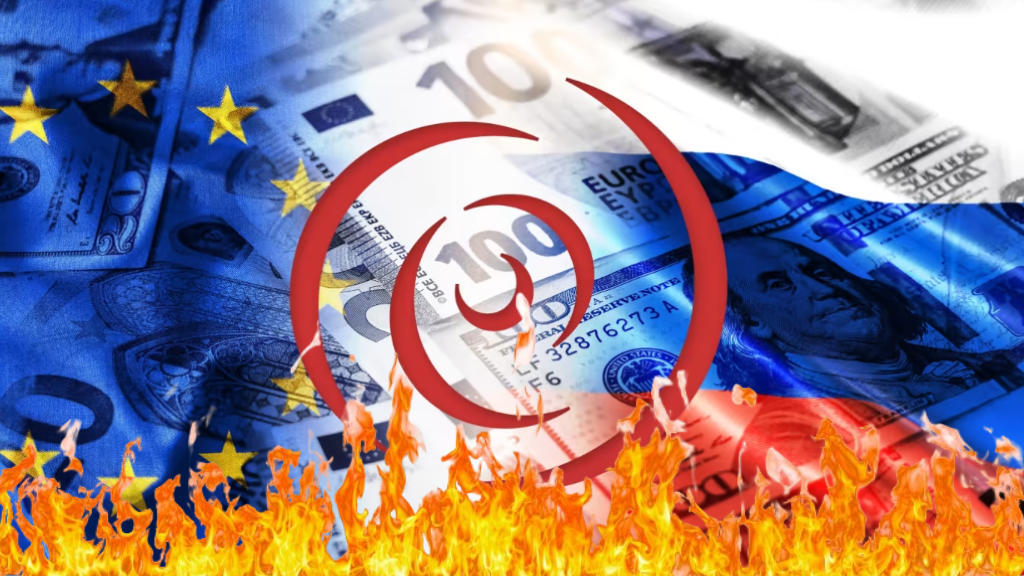Last week, the United States and European Union allowed the sending of interest earned from Russia’s frozen capital in the EU to Ukraine. This was intended to help Ukraine pay off a loan of US$20 billion it has secured from the West, and is an issue we discussed in some detail here.
Both US and EU officials have stated that eventually they intend to redistribute all of Russia’s frozen assets, being the principal capital – valued at some US$282 billion – and interest earned on that money. Russia, however, has stated that this amounts to ‘theft’ of its own money, and has reacted with numerous measures that we now discuss in this article.
Most of the EU-based funds are held in accounts by Euroclear, a financial settlements company acting as a clearing bank, that is now becoming increasingly worried about its own risks while having to abide by EU sanctions and follow government instructions.
Euroclear is expecting additional legal claims from the Russian Central Bank, and is already having to contend with up to 100 lawsuits filed in Russian courts over the sanctioned assets.
Euroclear is one of only two clearing houses operating in Europe, the other being Clearstream. Euroclear has €37.5 trillion of assets under management and also works on behalf of numerous European Sovereign Funds, in addition to owning equity in numerous European Stock Exchanges, including the London Stock Exchange. Euroclear also acts as the central securities depository (CSD) for Belgian, Dutch, Finnish, French, Irish, Swedish, and UK securities, and also owns EMXCo, the UK’s leading provider of investment-fund order routing.
The stakes though are shortly to rise higher, as Euroclear also has €33 billion in funds held in the national securities depository in Moscow, while Moscow also has a further €10 billion in accumulated Type “C” accounts, which are dividends and coupons paid to investors from unfriendly countries at Russia’s National Settlement Depository (NSD). Russia has prevented the repatriation of these funds back to their parent companies.
Russia may also take legal action to seize Euroclear assets held in Hong Kong and Dubai. If Russia acts, Western banks that have lost investment funds in Russia could also sue Euroclear, potentially leading to Euroclear’s bankruptcy and triggering a domino effect, given Euroclear’s key role in global financial transactions.
That in turn, as several EU officials, banks and lawyers have warned, could lead to an economic crisis as investors pull out of Euroclear due to perceived litigation risks and the freezing of their own funds held by the company.
Lieve Mostrey, the Euroclear CEO, has warned that plans – now carried out – to use Russia’s frozen assets to issue debt for Ukraine, or to seize the immobilized assets altogether, would pose serious financial risks to Europe. “When we come to the seizing of assets, then the trust in the Euroclear system, the trust in the European capital markets, and the trust in the Euro as a currency are all substantially affected.”
Paul Feldberg, a highly experienced lawyer and a partner of Brown & Rudnick White Collar Defense, Investigations & Compliance practice in London has said that “If these proposals move forward, the whole legal architecture would need to change, saying that “As far as banks go, I think they’re right to be concerned because we have already seen huge amounts of civil litigation in relation to sanctions.”
Kremlin spokesperson Dmitry Peskov has already stated that Russia is prepared for a decade-long legal battle over the potential seizure of its assets, saying that “If such decisions are made, they will have decades-long judicial consequences for those who make these decisions and for those who implement these decisions.”
Russian and other international lawyers and economists will be studying a response to the steps now taken by the EU, with the Russians already have war-gamed their next moves. Moscow itself will however be wary of breaking any laws as the EU appears to have done, as it will want to be seen as acting in a more responsible – and legal – manner than Brussels.
Consequently we do not see that Moscow will touch any part of the Euroclear or National Settlement Depository funds it holds. But what it could do is file claims against Euroclear assets overseas, and as mentioned in financial centres such as Hong Kong and Dubai.
Crucially, these claims would be heard in those jurisdictions and be subject to their laws and not those of the EU. An impact could be that while lawsuits are pending, courts in these jurisdictions could themselves ‘freeze’ Euroclear assets to the amounts being claimed to prevent them leaving their control. As Euroclear itself is a clearing bank, those assets would belong to other Western banks, who would in turn sue Euroclear for their return. That could, as described, set off a chain of lawsuits against the business, leading to more requests for the freezing of, and return of funds. A list of Euroclear’s top 20 shareholders can be seen here. It has links deep into the Western financial security architecture and disabling or partially disabling its operations by having its own clients litigate against it would be very much a win for Russia. It would also be likely to spark a corporate financial investor push back against European politicians – some of whom could be themselves targeted as responsible for breaking financial laws.
Euroclear could very much then end up being eaten by its own clients with a disastrous outcome pending as well for the European politicians responsible, and the financial clearing infrastructure within the EU. It is pertinent to note that in this particular struggle, Russia doesn’t have any risk, but the European Union most certainly does.
Further Reading

 Русский
Русский













